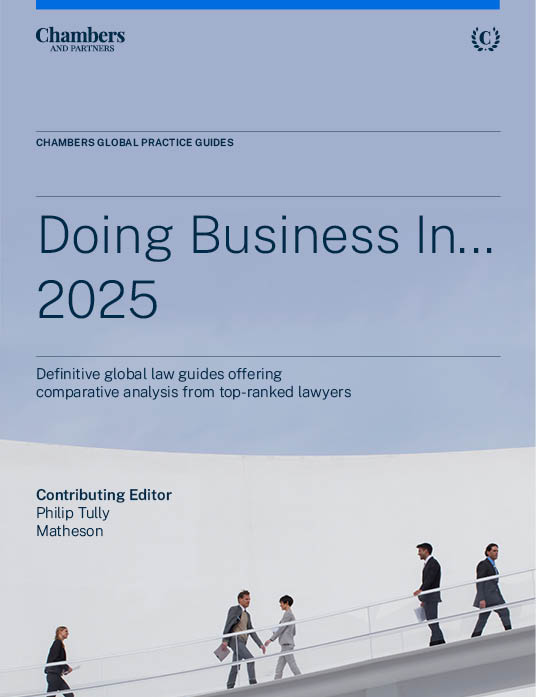
Doing Business In... 2025
The Doing Business In… 2025 guide covers a range of key jurisdictions. The guide provides the latest legal information on restrictions to foreign investments, corporate vehicles, employment law, tax law, competition law, intellectual property (IP), data protection and upcoming legal reforms.
Last Updated: July 15, 2025
Compare law and practice by selecting locations and topic(s)
Select Locations

Select Topic(s)

Please select at least one location and one topic to use the compare functionality.
Introduction
The seventh edition of Chambers Global Practice Guides: Doing Business In... is issued with the world’s economy facing significant uncertainty against a backdrop of ongoing economic and political crises.
Economic growth is weaker in 2025 than originally anticipated and forecasts are markedly down compared to 2024. Decreases in inflation have stalled and ongoing geopolitical tensions have contributed to the uncertain outlook.
One of the key trends that has emerged in 2025, and a significant contributing factor to economic activity being depressed and investment decisions being stalled, is the trade tensions that have developed amongst the world’s largest trading partners.
One key feature of the first half of 2025 has been the implementation by the new US administration of a number of significant tariff policy positions in advance of trade negotiations with a number of partners. This has triggered a departure from the relative stability of the global trade framework of the past century, resulting in increased uncertainty for businesses and policymakers globally.
This year has also seen a general decline of multilateralism in international policy matters and a rise in focus on regional interests as nations reassess and re-orientate their priorities, in some cases adopting more protectionist policies. This can be seen in the area of international taxation, where OECD members have thus far failed to reach agreement on the OECD’s Two Pillar solution to reform international tax rules for the digital age.
While some countries, including the EU member states, have implemented a minimum 15% tax (in line with the OECD’s Pillar Two proposals), certain aspects of these rules are now subject to doubt following confirmation from the US administration that they will not implement the Pillar Two rules but instead want a safe harbour to ensure that the US tax system sits side-by-side with the Pillar Two tax regime.
Negotiations on the OECD’s Pillar One framework have stalled, increasing the possibility for further destabilisation and fragmentation in the international tax framework as certain jurisdictions consider implementing digital services taxes and other unilateral tax measures, even in light of potential retaliation from the US.
Despite this volatile macro-environment, businesses and investors are proving resilient. One welcome development of the past 12 months has been a much-needed refocus by governments, particularly in Europe, on competitiveness and specifically on simplification measures and de-regulation. As governments respond to these macro challenges and seek to encourage growth, 2025 has seen the emergence of a willingness to reduce compliance and administrative burdens.
In Europe, the EU Commission is seeking to address recommendations from the recent Draghi report on competitiveness. The Commission is aiming to reduce administrative burdens by 25% by 2029 and has started adopting a number of proposals to make the EU’s economy more competitive by eliminating overlapping, unnecessary or disproportionate measures that create barriers for EU companies.
Looking ahead at key trends in the business environment, the speed of technological change and the rise of generative AI offers hope of generating opportunities for businesses but may also create legal challenges and require adaptation in many areas of business and law. The use of AI continues to build momentum as businesses continue to invest in ways that AI can drive efficiencies and revolutionise processes.
What is therefore evident again this year is that businesses and investors, who remain interconnected globally, even as government policies diverge, must keep up-to-date with the many changes in laws and regulations taking place around the world, with the pace of change from governments and regulators seemingly ever increasing.
In the context of this global macro environment, the 2025 edition of the Doing Business In... guide provides a concise summary of the key legal and tax considerations for doing business in countries around the world. It serves as an essential reference point for both lawyers and investors looking to understand the basic principles and legal frameworks of the relevant jurisdictions.
The contributing experts for each jurisdiction have followed a common template, allowing readers to easily compare and contrast different jurisdictions.
The guide also summarises recent developments and updates that are of particular importance for those doing business in 2025.
We would like to thank all of the participating contributors for their efforts in making this Doing Business In... guide such a vital resource and an essential component of the Chambers Global Practice Guides series.
